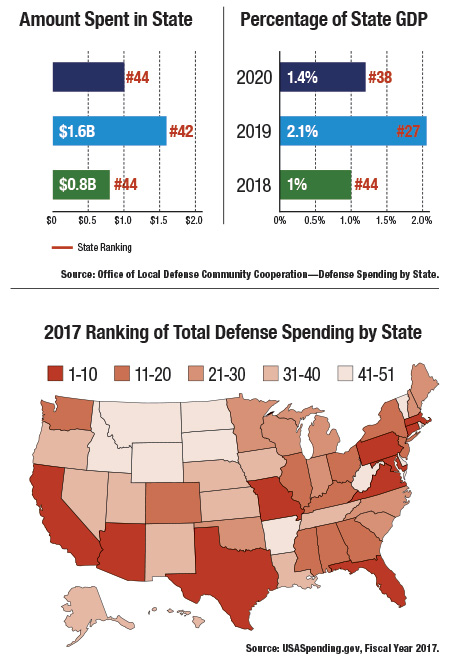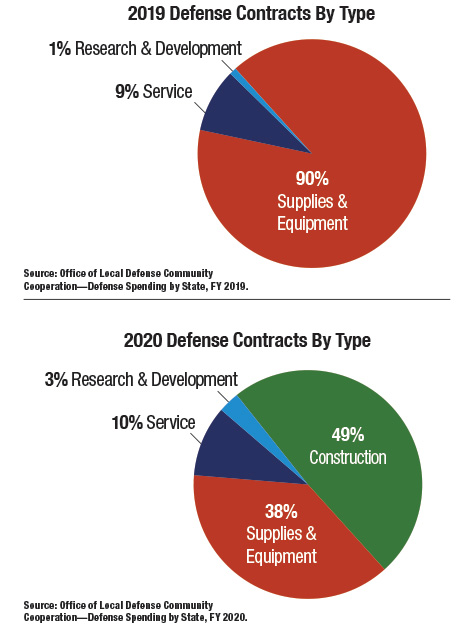Growing the Defense Industry
By Samantha Cart
“I believe West Virginia is poised to make the defense industry the second most profitable industry in the state,” says Eric Clark, federal contractor and defense liaison for the West Virginia Department of Economic Development.
While the energy industry has almost always dominated the number one spot in the Mountain State’s economy, Clark and his peers are working to make defense a driving economic force.
State leadership has been laying the groundwork for the defense industry’s accession for years. In 2014, the U.S. Department of Defense (DOD)’s Office of Economic Adjustment (OEA), now known as the Office of Local Defense Community Cooperation, provided funding for each state to map its defense supply chain to ensure resiliency. Initially, Anne Barth, executive director of TechConnect West Virginia, met with OEA officials to learn more about what this opportunity meant for the Mountain State.
With collaboration from the West Virginia Department of Commerce, West Virginia University (WVU) and TechConnect received $1 million in grant funding to engage external consultants in research and help mapping West Virginia’s defense industry supply chain. The Center for Regional Economic Competitiveness (CREC) was chosen for this research and provided the West Virginia Defense Industry Supply Chain Report, which was published in 2018 and helped inform state leaders, manufacturers and stakeholders of the contributions, impacts and potential opportunities this sector represents.
The report concluded that West Virginia should actively promote a dynamic defense industry. Along with opportunities to utilize the state’s existing manufacturing infrastructure, the DOD awards billions of dollars in contracts each year, funding that flows through federal contractors and subcontractors all the way down to local businesses and into communities. The study also found that the best ways to help West Virginia’s defense industry partners would be to encourage collaboration between companies and provide them with information and resources to accelerate growth.
Today, West Virginia leaders are checking these boxes and championing the defense industry in a myriad of ways, including the recent launch of the West Virginia chapter of the National Defense Industrial Association (NDIA). The NDIA is a nonpartisan, nonprofit organization that educates its members on all aspects of national security and provides a platform for government, industry and academia to collaborate on solutions that advance the country’s defense needs.
The NDIA has six strategic priorities, including promoting technological innovation, fostering small business success and strengthening the nation’s defense workforce, and these are the areas in which the West Virginia chapter will shine.
The West Virginia NDIA (WVNDIA) chapter was created to support national security by growing and enhancing the defense industry and federal contracting in West Virginia through networking and collaboration and by increasing opportunities for business development.
“The NDIA is the place in West Virginia that everybody and every company interested in contributing to the defense industry can come to meet, share ideas and work to strengthen our industry,” says Craig Hartzell, president, CEO and founder of Azimuth Inc. and president of the WVNDIA. “It is a place we can have strategic discussions with state leaders and prime contractors about ensuring the sector is strong and growing in West Virginia. Finally, it is a place we can collaborate and coordinate our local efforts in the best interests of our nation’s defense industry needs.”
Opportunities for Growth
The defense industry supply chain is an important part of West Virginia’s economy in part because of its strong manufacturing sector. This creates a growth opportunity not just for defense contractors but also for existing and potential downstream suppliers.
“There is an opportunity for downstream suppliers from multiple sectors—steel manufacturers, aluminum manufacturers, wiring, chemicals, IT services, engineering services—to participate,” says Clark.
According to David Satterfield, director of asset development at WVU and WVNDIA board member, West Virginia has an important role to play in the resiliency and reshoring of the defense supply chain.
“Because of our proximity, skilled labor, institutions of higher education and the quality of the manufacturers in our state, West Virginia has a unique opportunity to expand and enhance its contributions to this important sector,” he says. “Some of the largest contributing states to the defense industry are our contiguous neighbors. I am proud that West Virginia is actively pursuing this opportunity.”
Overcoming Obstacles
 In 2020, West Virginia received $1 billion in DOD contracts. While this represents an exciting economic impact and growth opportunity, there are also significant barriers to entering the federal contracting arena.
In 2020, West Virginia received $1 billion in DOD contracts. While this represents an exciting economic impact and growth opportunity, there are also significant barriers to entering the federal contracting arena.
Satterfield says that in addition to meeting the quality standards and performance aspects of its own industry, there are additional qualifications that must be met for a business to become a defense contractor. This can include advanced accounting standards and security requirements, among other things. While each of these is challenging on its own, sometimes when combined they are too much for a small business to address alone. Another barrier may be due to the fact that each federal agency has its own unique requirements for contractors; so, a company that wants to participate in a defense contract may have to know and meet the compliance requirements for the DOD as well as the U.S. State Department and/or the U.S. Department of Commerce.
“Being a contributing member to the DOD supply chain is a point of pride for my company and me; although I will say, it is not easy,” says Hartzell. “Being a supply chain member means you must comply with many standards, provisions and requirements set forth to ensure the quality of the product and the security of the intellectual property and technical specifications going into that work. For many small and medium companies, I am sure it’s overwhelming.”
Part of the work of the WVNDIA will be helping Mountain State businesses understand and overcome these obstacles, especially since there has been a national decline in the number of small businesses in the DOD supply chain.
“We will do everything we can as a chapter to help small enterprises enter and stay in the sector,” Satterfield says.
Hartzell has had great success as a life and corporate member of the NDIA and is passionate about its value.
“The NDIA serves as a link, advocate and voice for the small business trying to comply with these requirements. They are always open to questions and provide good advice to companies trying to navigate this challenging circumstance,” he says.
With Hartzell at the helm, the WVNDIA is primed to offer the same support to the Mountain State business community.
“Trying to assist small companies in addressing these barriers and becoming part of the defense industry in West Virginia is one of our most important missions as a chapter,” he says. “My company was very fortunate to participate in the mentor protégé program in our early days, and I look forward to serving as a mentor to other small companies. Make no mistake—we all benefit when more companies can participate in West Virginia’s defense sector.”
Putting Our Best Foot Forward
The West Virginia Department of Economic Development often works alongside the West Virginia National Guard to tell the story of why the Mountain State is the ideal place for the defense industry to flourish, including its top-tier training facilities.
“We have great facilities in the state for training in maintenance, electronic services, surveillance and technology,” Clark says. “A lot of people don’t know that many agencies from the special forces community come to train in West Virginia, and it is West Virginia Guardsmen who train them. There is a real opportunity for West Virginia to have a larger footprint than we do.”
Another piece of the defense industry puzzle in West Virginia is the presence of not just federal contractors but federal agencies, including the FBI, NASA and the U.S. Department of Homeland Security.
“We are trying to recruit other agencies to come to the state and consider West Virginia as a home base,” says Clark. “The Opportunity Move project is a state initiative to attract other agencies and federal contractors to come to the state for development, research and collaboration with our major universities. We are always trying to bring in more manufacturers when we can as well.”
This collaboration with the state’s universities will be of particular use in obtaining higher credentials for those participating in the cybersecurity sector of the defense industry. According to Major General James Hoyer, USA, Retired, vice president of economic innovation at WVU, one of the key issues in the defense sector is the ability to secure and protect data and communications.
“The WVNDIA is a key facilitator for helping companies maintain cybersecurity,” Hoyer says. “The chapter has created a collaborative environment among defense sector companies and those who want to grow into the defense space. Education and training to grow a capable and stable workforce will be key to West Virginia’s future growth and success in the defense industry.”
Clark says the WVNDIA will add knowledge, clarity and opportunity to the cybersecurity sector in West Virginia through its education efforts.
“The universities are the leaders, and each of them has a large footprint,” he says. “We need them to focus their curriculum so when students graduate, they have job placements within the industry.”
Another goal of the WVNDIA is helping students graduate with security clearance. Clark believes if the state can graduate students with the right clearance and training, it will create an ocean of qualified individuals for recruitment who can support the industry.
“If you create an ocean, then you create oceanfront property, and that oceanfront property will be the largest defense companies and federal agencies coming to our state to recruit,” he says. “We can create that ocean of talent here. That is part of the mission of the NDIA.”
The continued growth of the defense industry could mean a lot for West Virginia, but when asked, Hartzell says the impact can be summed up in one word: jobs.
“Good jobs that turn into careers. Jobs that matter. Jobs that will allow our citizens to know they are making an important contribution to an essential sector of our economy while at the same time helping to ensure the defense of our country’s national interests,” he says. “West Virginia has always supported and contributed to the defense industry and supported the warfighter. With the WVNDIA and a spirit of cooperation like I have never before witnessed, I
believe West Virginia will play a greater part in this sector and that the defense industry will truly be a sector for growth well into the future.”




